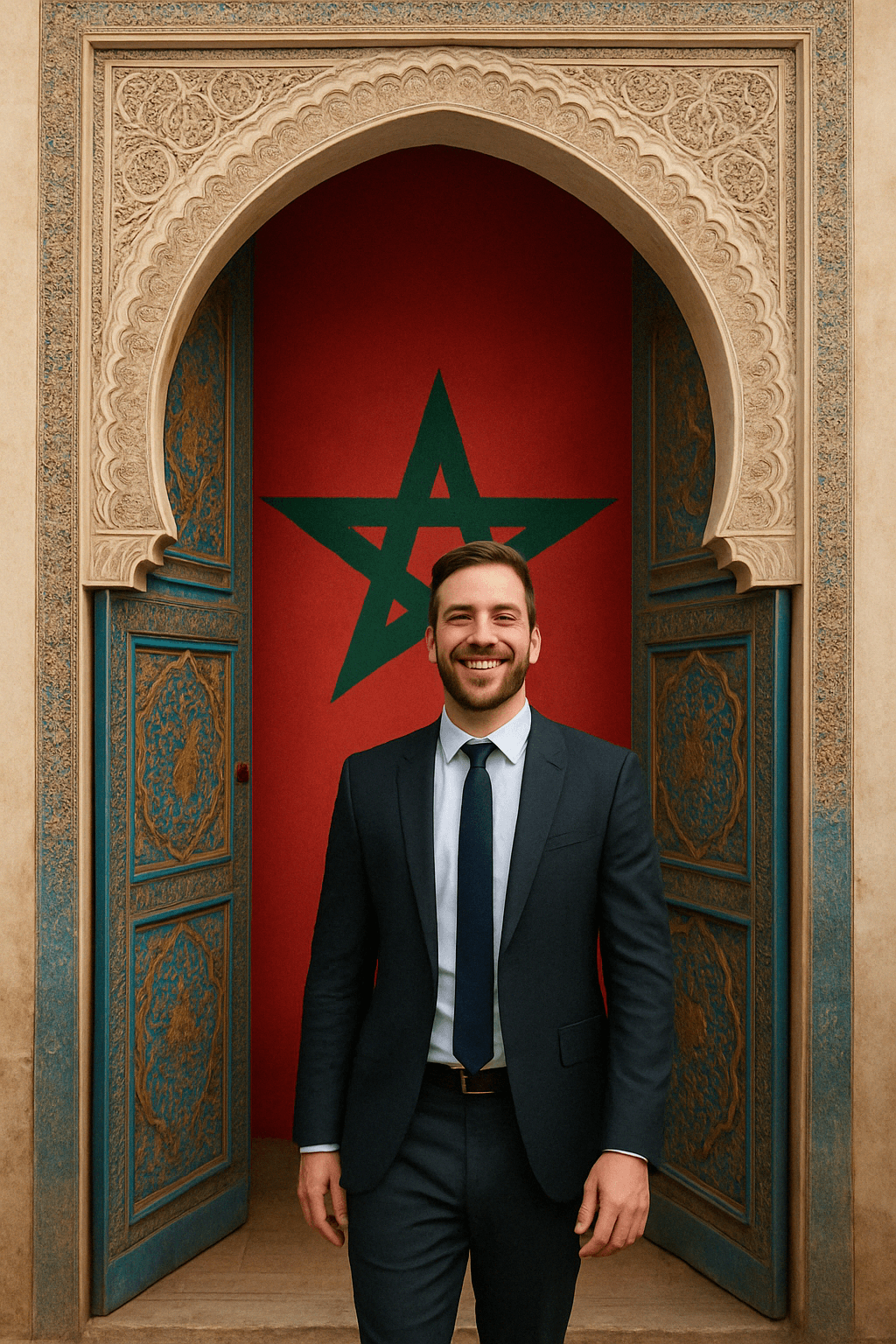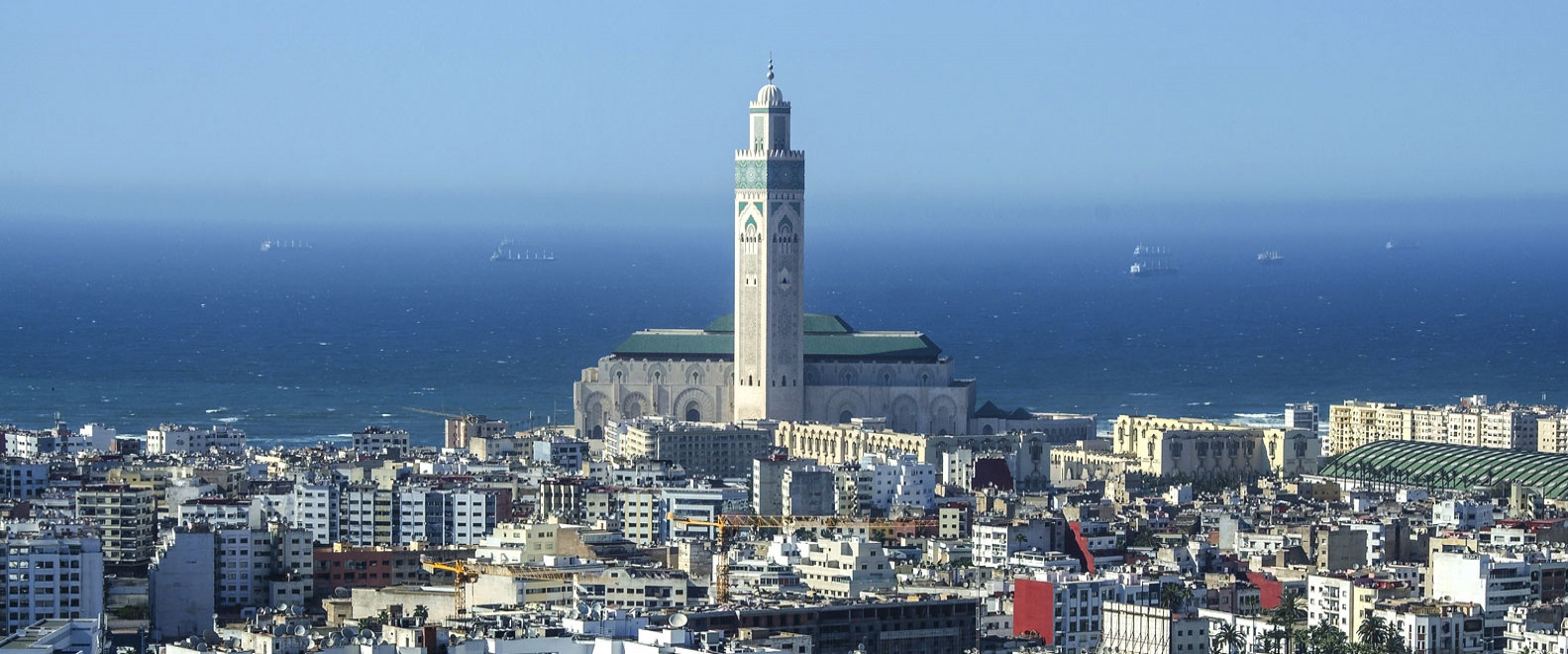Geographic & Strategic Location
1. Dual-Coast Advantage
Morocco is uniquely positioned along both the Atlantic Ocean and the Mediterranean Sea, giving it access to some of the world’s busiest maritime routes. This dual-coast access not only facilitates diversified trade but also positions Morocco as a natural bridge between Europe, Africa, and the Americas.
2. Proximity to Europe
Just 14 kilometers separate Morocco from Spain across the Strait of Gibraltar, making it one of the shortest sea crossings to Europe. This proximity enables faster, more cost-efficient logistics and strengthens economic interdependence with European markets.
Political & Economic Stability
3. Long-Term Political Stability
Since gaining independence in 1956, Morocco has avoided coups or regime changes, maintaining a consistent political framework. This record of stability reassures investors and fosters long-term development planning.
4. Monarch-Parliamentary System
Morocco’s hybrid political model blends the stability of a monarchy with the representation of a parliamentary system. This balance provides governance continuity while allowing for gradual, predictable reforms.
Economic Fundamentals
5. GDP Growth at 3.6% in 2025
According to the World Bank, Morocco’s GDP will expand by 3.6% in 2025, an improvement from 3.2% in 2024. This acceleration is backed by diversified economic drivers, including industry, trade, and services.
6. Optimistic Growth Outlook
National planners and finance analysts see an even brighter picture, projecting growth between 3.8% and 4.4%. Non-agricultural sectors such as manufacturing and tourism are expected to lead this expansion.
7. Public Debt Around 70% of GDP
Morocco’s public debt ratio reached roughly 70% in 2023–2024, higher than earlier estimates. While this is a moderate burden, prudent fiscal management will be key to sustaining growth.
8. Strong Reserves
With foreign exchange reserves covering 5.5 months of imports—about $33 billion—Morocco has a healthy buffer to support currency stability and absorb external shocks.
Demographics
9. Population of 36.8 Million
As of mid-2024, Morocco’s population stood at about 36.8 million. This growing population expands the domestic consumer base while supplying labor for multiple industries.
10. Median Age of 29.8
A youthful median age of 29.8 means a workforce that is dynamic, adaptable, and digitally inclined—crucial for competing in modern industries.
Energy & Sustainability
11. Noor Solar Complex
Morocco’s Noor Solar Complex ranks among the world’s largest, symbolizing its commitment to renewable energy leadership. It plays a central role in reducing fossil fuel dependency.
12. Green Hydrogen Projects
In March 2025, Morocco approved $32.5 billion in green hydrogen investments across six plants, aiming to become a global supplier in the emerging clean energy economy.
Port & Infrastructure Powerhouse
13. Tanger Med: Africa’s Largest Port
For eight consecutive years, Tanger Med has been Africa’s top container port, underscoring Morocco’s strategic logistics capacity.
14. 10.24 Million TEUs in 2024
The port handled 10.24 million containers in 2024, an 18.8% jump from the previous year, demonstrating its growing trade volume.
15. 142 Million Tonnes Cargo
Tanger Med’s cargo throughput reached 142 million tonnes in 2024, up 16.2% from 2023, cementing its role as a trade gateway.
16. 516,842 Ro-Ro Trucks
The port processed over half a million roll-on/roll-off trucks in 2024, reflecting Morocco’s industrial and agricultural export strength.
17. 3 Million Passengers in 2024
Passenger traffic surged to more than 3 million in 2024, a 13% rise from the previous year, reinforcing Tanger Med’s role in tourism and migration.
18. Ranked 17th Globally
In 2024, Tanger Med ranked 17th among the world’s container ports, outperforming major European hubs like Hamburg.
19. Top Efficiency Rankings
The port was named the world’s third-most efficient by the World Bank and S&P Global, showcasing operational excellence.
Digital Transformation & Startup Growth
20. Youth-Driven Digital Workforce
With fast internet growth and a tech-savvy youth, Morocco is expanding its ICT and outsourcing industries.
21. Digital Morocco 2030 Strategy
The plan aims to double the tech workforce to 270,000 and increase digital exports from $1.6B to $4.3B by 2030.
22. Global Startup Rank: 88th
Morocco’s startup ecosystem grew 23.1% in 2025, making it the fastest-growing in North Africa.
23. Casablanca: 317th Worldwide
Casablanca jumped 42 places globally thanks to over 40% startup ecosystem growth.
24. Rabat & Other Cities Rise
Rabat climbed to 811th globally, while Marrakech and Tangier also entered the rankings, diversifying Morocco’s innovation hubs.
Business-Friendly Environment
25. Industrial Acceleration Zones
Zones like Tangier Free Zone and Kenitra’s Atlantic Free Zone offer tax holidays and reduced rates for decades.
26. Up to 30% Investment Subsidies
Foreign investors can access grants up to 30% of project value plus preferential financing.
27. Streamlined Business Setup
Centralized “one-stop shops” simplify company formation and permits, backed by Morocco’s new Investment Charter.
28. 100% Foreign Ownership
In most sectors, foreign investors can fully own companies and repatriate profits freely.
29. Bilateral Treaties
Over 60 bilateral investment treaties and international arbitration options protect investors.
Innovation & Intellectual Property
30. Top IP Ranking in Africa & Arab World
Morocco ranked 22nd globally in 2025’s International IP Index, scoring 59.21—first in Africa and the Arab world.
31. Robust IP Framework
Morocco has ratified major treaties like the Singapore Treaty and Geneva Act, and uses fast-track patent systems.
32. Enforcement Gaps
Despite strong laws, enforcement—especially for innovation and pharmaceuticals—remains an area for improvement.
Sector-Specific Strengths
33. Automotive Leader
Morocco produces 700,000 vehicles annually and exported $14B in 2023, now pivoting to EV production.
34. Gotion EV Battery Plant
China’s Gotion will open Morocco’s first EV battery gigafactory in 2026 with 20 GWh capacity and expansion plans.
35. Aerospace Cluster Growth
Supplying Boeing and Airbus, Morocco’s aerospace sector is expanding in manufacturing and R&D.
36. Agricultural Export Strength
Morocco is a top exporter of citrus and vegetables, focusing on sustainable practices.
37. Tourism Investment Gap
Tourism demand outpaces infrastructure, creating opportunities for hotels and attractions.
38. Financial Services Expansion
Banking, insurance, and fintech are underdeveloped, leaving room for market entry.
International Trade & Partnerships
39. EU Advanced Status
Morocco enjoys regulatory alignment and trade advantages with the EU, boosting exports.
40. African Union Engagement
Since rejoining in 2017, Morocco has strengthened continental partnerships.
41. US Free Trade Agreement
One of only two African countries with full preferential access to the US market.
42. Gulf Investments
UAE, Saudi, and Qatari capital is flowing into Moroccan infrastructure and industries.
43. China’s Belt & Road Participation
Morocco’s involvement strengthens connectivity with Asia and other markets.
44. Foreign Trade Roadmap 2025–2027
Targets include 76,000 new jobs, 400 new exporters annually, and $8.4B in export growth.
45. Eurasian Economic Union Engagement
Morocco is exploring trade opportunities with Eurasian markets through a cooperation memorandum.




-min.jpg)
.jpg)
.jpg)
